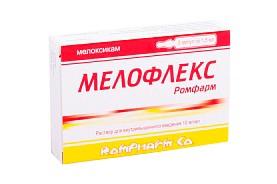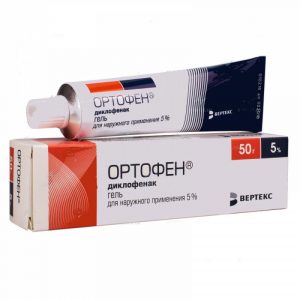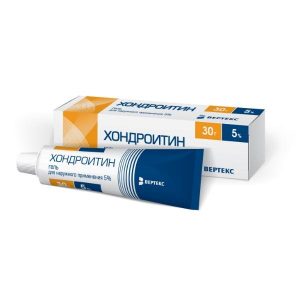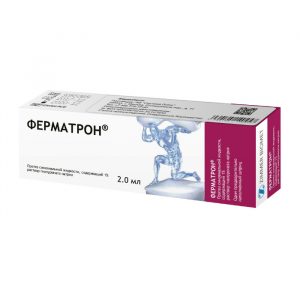Description
Release form
Intramuscular solution.
Packaging
3 ampoules.
Pharmacological action
Meloflex Rompharm – NSAIDs, refers to derivatives of enolic acid and has anti-inflammatory, analgesic and antipyretic effects.
The pronounced anti-inflammatory effect of meloxicam has been established on all standard models of inflammation. The mechanism of action of meloxicam is its ability to inhibit the synthesis of prostaglandins – known mediators of inflammation.
In vivo meloxicam inhibits prostaglandin synthesis at the site of inflammation to a greater extent than in the gastric mucosa or kidneys. These differences are associated with a more selective inhibition of cyclooxygenase-2 (COX-2) compared with cyclooxygenase-1 (COX-1). Believed that inhibition of COX-2 provides a therapeutic effect of NSAIDs, whereas inhibition of the constantly present COX-1 isoenzyme can cause side effects from the stomach and kidneys. The selectivity of meloxicam in relation to COX-2 is confirmed in various test systems, both in vitro and ex vivo. The selective ability of meloxicam to inhibit COX-2 is shown when using in vitro human whole blood as a test system.
Ex vivo found that meloxicam (at doses of 7.5 mg and 15 mg) more actively inhibited COX-2, having a greater inhibitory effect on the production of prostaglandin E2 stimulated by lipopolysaccharide (a reaction controlled by COX-2) than on the production of thromboxane involved in the process blood coagulation (reaction controlled by COX-1). These effects were dose dependent. Ex vivo shown that meloxicam at the recommended doses did not affect platelet aggregation and bleeding time, unlike indomethacin, diclofenac, ibuprofen, and naproxen, which significantly inhibited platelet aggregation and increased bleeding time.
Indications
– rheumatoid arthritis
– osteoarthritis
– ankylosing spondylitis (ankylosing spondylitis).
Designed for symptomatic therapy, reduce pain and inflammation at the time of use, does not affect the progression of the disease.
Contraindications
– a combination of bronchial asthma, recurrent polyposis of the nose and paranasal sinuses and intolerance to acetylsalicylic acid and pyrazolone series
– gastric ulcer and duodenal ulcer disease
Precautions
– old age
– coronary heart disease
– chronic heart failure
– cerebrovascular disease
– dyslipidemia / hyperlipidemia
– diabetes mellitus
– peripheral artery disease
mcp – 30 – mcp – 30
– a history of gastrointestinal ulceration
– the presence of Helicobacter pylori
infection – prolonged use of NSAIDs
– alcoholism
– severe somatic diseases
– concomitant use of oral corticosteroids (including prednisone), and tikoagulyantov (including warfarin), antiplatelet agents (including clopidogrel), selective serotonin reuptake inhibitors (including citalopram, fluoxetine, paroxetine, sertraline).
Pregnancy and lactation
Suppression of prostaglandin synthesis may have an undesirable effect on pregnancy and fetal development. Thus, Meloflex Rompharm is contraindicated during pregnancy.
The drug passes into breast milk, so Meloflex Rompharm is contraindicated in lactation. At the time of taking the drug, it is necessary to stop breastfeeding.
Special instructions
Caution should be exercised in the treatment of patients with a history of gastrointestinal tract diseases. Patients, in which gastrointestinal symptoms are noted, should be regularly observed. If there is a gastrointestinal ulcerative lesion or gastrointestinal bleeding, Meloflex Rompharm must be canceled.
As with other NSAIDs, gastrointestinal bleeding, ulcers and perforations that are potentially life-threatening to the patient can occur during treatment at any time, both in the presence of alarming symptoms or history of serious gastrointestinal complications, as well as lack of these signs. The consequences of these complications are generally more serious in the elderly.
Particular attention should be paid to patients reporting the development of adverse events from the skin and mucous membranes. In such cases, the question of stopping the use of the drug Meloflex Rompharm should be considered.
In patients with reduced BCC and reduced glomerular filtration (dehydration, chronic heart failure, cirrhosis, nephrotic syndrome, clinically pronounced kidney disease, diuretics, dehydration after major surgeries), the appearance of clinically pronounced chronic renal failure, which is completely reversible after withdrawal drug (in such patients, at the beginning of treatment, daily diuresis and renal function should be monitored).
With persistent and significant increase in transaminases and changes in other indicators of liver function, the drug should be discontinued and control tests performed.
In patients with an increased risk of side effects, treatment begins with a dose of 7.5 mg. In the terminal stage of chronic renal failure in patients on dialysis, the dose should not exceed 7.5 mg / day.
Influence on the ability to drive vehicles and control mechanisms
There is no evidence of a negative effect of the drug on the ability to drive vehicles or work with mechanisms. In case of disorders of the central nervous system (decreased visual acuity, increased fatigue, dizziness or other disorders), these activities are contraindicated.
Composition
1 ml: – meloxicam 10 mg
Excipients: meglumine – 6.25 mg, glycofurfural – 100 mg, poloxamer 188 – 50 mg, glycine – 5 mg, sodium chloride – 3.5 mg, sodium hydroxide solution 1M – pH 8.6-9, water d / and – up to 1 ml.
Dosage and administration
The drug is administered deeply in oil. In / in contraindicated.
Intramuscular administration of Meloflex Rompharm is indicated only during the first days of treatment. Further treatment is continued with the use of oral forms (tablets).
Osteoarthrosis in the acute phase – 7.5 mg / day. If the condition does not improve, you can increase the dose to 15 mg / day.
Rheumatoid arthritis, ankylosing spondylitis – 15 mg / day. Depending on the therapeutic effect, the dose can be reduced to 7.5 mg / day. The daily dose of meloxicam 15 mg should not be exceeded.
In elderly patients, the recommended dose for long-term therapy of rheumatoid arthritis or ankylosing spondylitis is 7.5 mg / day. In elderly patients with an increased risk of side effects, therapy should be started with a dose of 7. 5 mg / day.
In patients on dialysis with severe renal failure, the daily dose of meloxicam 7.5 mg should not be exceeded. In patients with mild or moderate renal impairment (creatinine clearance greater than 25 ml / min), there is no need to reduce the dose.
In patients with mild or moderate hepatic impairment, there is no need to reduce the dose of Meloflex Rompharm.
Side effects
Frequency of side effects: often (more than 1%) infrequently (0.1-1%) rarely (0.01-0.1%) very rarely (less than 0.01%).
From the digestive system: often – dyspepsia, incl. nausea, vomiting, abdominal pain, constipation, flatulence, diarrhea infrequently – a transient increase in hepatic transaminase activity, hyperbilirubinemia, belching, esophagitis, gastroduodenal ulcer, gastrointestinal bleeding (including hidden), stomatitis rarely – gastrointestinal perforation, colitis, gastritis.
From the side of hematopoietic organs: often – anemia infrequently – a change in the blood formula, incl. leukopenia, thromocytopenia.
From the skin: often – itching, skin rash infrequently – urticaria rarely – photosensitivity, bullous rashes, erythema multiforme, including Stevens-Johnson syndrome, toxic epidermal necrolysis.
From the respiratory system: infrequently – the occurrence of attacks of bronchial asthma in people allergic to acetylsalicylic acid or other NSAIDs.
From the side of the central nervous system: often – dizziness, headache infrequently – vertigo, tinnitus, drowsiness rarely – confusion, disorientation, emotional lability.
From the cardiovascular system: often – peripheral edema infrequently – increased blood pressure, sensation of palpitations, flushing of the face.
From the urinary system: infrequently – hypercreatininemia and / or an increase in the concentration of urea in the blood serum rarely – acute renal failure, no connection with meloxicam has been established – interstitial nephritis, albuminuria, hematuria.
On the part of the sensory organs: rarely – conjunctivitis, visual impairment, including blurred visual perception.
Allergic reactions: rarely – angioedema, anaphylactoid / anaphylactic reactions.
Drug Interactions
– Pharmacodynamic Interactions: Simultaneous administration of several NSAIDs (including salicylates) may increase the risk of erosive and ulcerative lesions of the gastrointestinal tract due to a synergistic effect, therefore, the use of meloxicam with other NSAIDs is not recommended.
When using meloxicam with diuretics, the patient needs to use a sufficient amount of fluid, and regular medical monitoring of kidney function is required before and during treatment.
Combined use with indirect anticoagulants increases the risk of bleeding due to inhibition of platelet function and damage to the mucous membrane of the stomach and intestines. Therefore, they do not recommend combined use with NSAIDs and indirect anticoagulants.
With the combined use of thrombolytic and antithrombotic drugs with meloxicam, an increased risk of bleeding is possible (periodic monitoring of blood coagulation is necessary).
Concomitant use with ACE inhibitors and other antihypertensive drugs in elderly patients with symptoms of dehydration can provoke the development of acute renal failure. In addition, combined use with meloxicam may reduce their antihypertensive effect.
Meloxicam enhances the nephrotoxic effect of cyclosporine.
Meloxicam may decrease the effectiveness of birth control.
– Pharmacokinetic interaction: NSAIDs may increase serum lithium concentrations to toxic levels (decreased lithium excretion by the kidneys). Therefore, the simultaneous use of meloxicam with lithium preparations is not recommended. If necessary, their combined use should carefully monitor the lithium content in the blood serum before starting, during and after the course of therapy with meloxicam and lithium preparations.
Concomitant use with methotrexate increases the negative effect on the hematopoiesis system (risk of anemia and leukopenia). Periodic monitoring of the hemogram is necessary.
Colestyramine accelerates the elimination of meloxicam, increasing the clearance of meloxicam by 50%, and decreasing its T1 / 2 by 13 ± 3 hours. This interaction is of clinical importance.
With concomitant use with antacids, cimetidine and digoxin, no significant clinical interaction was noted.
NSAIDs decrease the effectiveness of contraceptive intrauterine devices.
When combined with meloxicam and drugs that have a known ability to inhibit CYP2C9 and / or CYP3A4 (or are metabolized with these enzymes), the possibility of pharmacokinetic interaction should be taken into account. The possibility of the interaction of meloxicam with oral hypoglycemic agents cannot be ruled out.
With the simultaneous use of meloxicam with selective serotonin reuptake inhibitors, the risk of developing gastrointestinal bleeding increases.
Overdose
Increased dose-related side effects.
Symptoms: impaired consciousness, nausea, vomiting, epigastric pain, gastrointestinal bleeding, acute renal failure, acute liver failure, respiratory arrest, asystole.
Treatment: symptomatic therapy. Forced diuresis, alkaline urination, hemodialysis are ineffective due to the high degree of binding of meloxicam to plasma proteins. No specific antidote
Active ingredient
Meloxicam
Form of Treatment
simply entails dlya inaektsiy
K.O. Rompharm Company S.R.L., Romania




